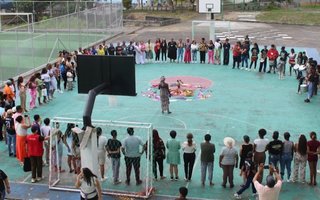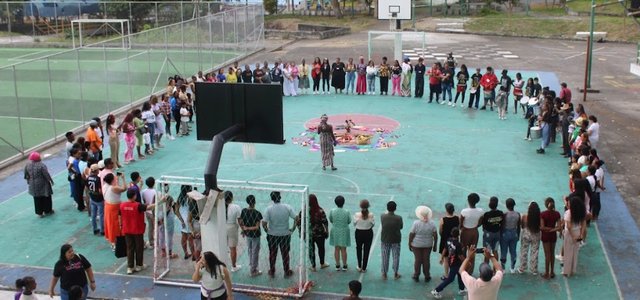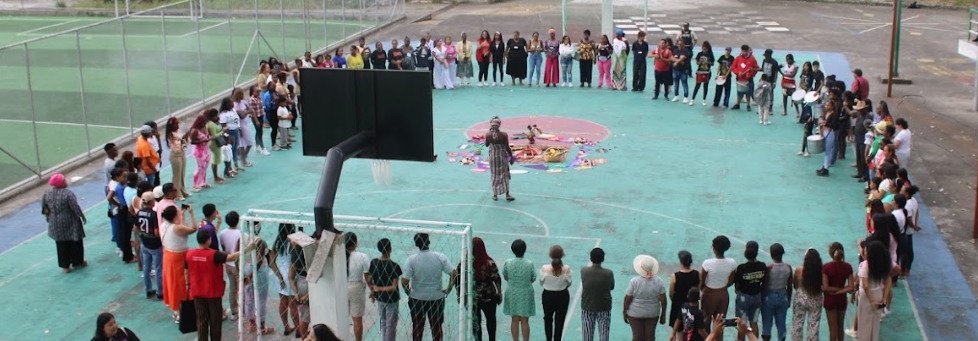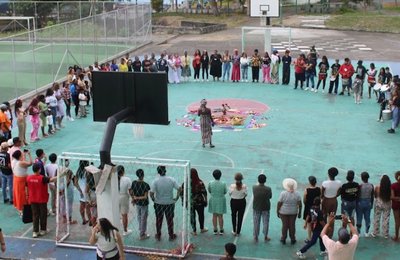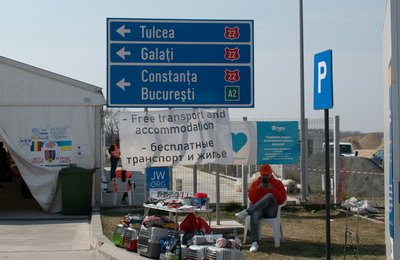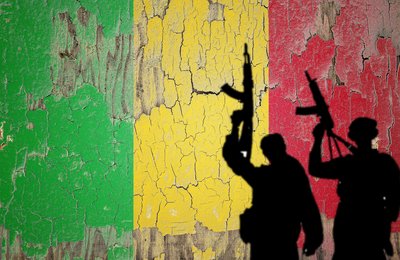The rhythm of resistance
A Batucada is a style of Afro-Brazilian percussion music, known for its fast-paced, rhythmic drumming played by large ensembles. Traditionally performed in street parades, Batucadas are vibrant, collective, and often used to energise crowds, protest, or celebrate. Batucadas turn rhythm into a powerful form of expression.
In 2020, as COVID-19 shut down Ecuador’s schools and forced families to stay indoors, Guayaquil found itself at the epicenter of the country’s humanitarian crisis. But a group of artists led by sociologist Xavier Moreira and his partner, Johana Chevez saw opportunity in rhythm.
“Our kids were quarantined, and there was this narrative of “unruly Guayaquil” going around. Police monitored [when] our kids [were] going back inside at all times. La Batucada starting with our kids was a way to mitigate the fear around [going outside]. To do something collectively”, adds Xavier.
What started as a pandemic coping mechanism quickly evolved into a tool for community-building and peace making, growing around Guayaquil. While an all-female Batucada was one of the first groups to form, Batucada Popular started partnering up with local leaders in different neighborhoods, opening chapters across the city.
Violence takes over the city
Ecuador has become a strategic hub for drug trafficking, with coastal cities like Guayaquil serving as key export points. The economic toll of the COVID-19 pandemic created fertile ground for criminal networks to expand. Local gangs have violently competed for control, turning entire neighborhoods, often the most deprived ones, into no-go zones and recruiting vulnerable youth.
Authorities have struggled to regain control in many affected areas. The military and police have the support of the current administration, which provides increased funding for punitive measures against crime, but there is no room for social rehabilitation or peacebuilding.
As organised crime surged in Guayaquil, Batucada Popular became more than a music programme. It became an act of resistance.
Claiming space through sound
Batucada Popular’s methodology focuses on creating groups of children of different ages in the same neighborhood. Volunteers usually teach the kids the rhythm and how to play the drums. After a few days, spaces emerge for reflection about violence and a safe environment. “With the recruitment and ongoing violence, we want to show kids alternatives, that joining a gang is not the solution to the ongoing violence” adds Xavier.
A Batucada needs a structure and a lead, and that is when teenagers and older members play a key role.
Jonathan, 21, joined the Batucada when he was 18, in 2021, when a chapter reached his neighborhood. “It was the soft skills and the leadership aspects that made me want to join, the drums were second” he says. He had liked participating in community initiatives before. As the pandemic hit and violence took over his neighborhood, the fear halted many initiatives but the Batucada Popular has proven to be an alternative. “Here, the drums are your safe space.”
Participants like Jonathan see the Batucada Popular not just as an activity, but as a shield. Marching together with drums has become a way to claim space in a peaceful, joyful and loud way, taking up space in neighborhoods often controlled by fear.
Drumming as emotional armor
Amelia, 19, joined the Batucada Popular at 14. She credits the programme for giving her a sense of purpose and an emotional anchor. “(The programme) sparks joy as a political act and builds community through art. We want something different for our city.”
Amelia is now leader of a Batucada in Sociovivienda, a neighborhood under the control of gangs fighting a turf war. She’s been able to stay away from the violence; the weekly rehearsals offer a sense of structure and solidarity in the middle of the chaos. She’s looking forward to bringing all the neighborhood’s Batucada Popular together for an event in November. “We had about 150 members last year and we expect at least 250 people to participate.”
A beat that travels
Though it began in Guayaquil, Batucada Popular has inspired similar initiatives across Ecuador. As Batucada Popular grew, some funding from international cooperation allowed the group and their methodology to expand in some of the provinces most vulnerable to violence.
For Xavier the goal is not to create professional musicians, but active citizens. “The goal has never been to go professional but to provide an outlet. Given how energetic it is to play drums, it allows the kids to let go of all those issues. And that sense of pride I see yearly in November at their big event. Pride, a sense of belonging…all those are elements you need to build peace.”
Ecuador continues to be one of the countries with the highest homicide rate in the world. Guayaquil, as the largest city and port in the country, is among the most violent. Kidnappings for ransom, petty crimes and forced recruitment are some of the threats its residents face each day.
Despite the grim scenario, The Batucada Popular initiative continues to grow, often working in partnership with universities and human rights organisations. Its members now advocate for arts as part of public safety policy, pushing for investment in culture as a tool for violence prevention.
Lasting echoes
As Guayaquil grapples with ongoing security challenges and violence that does not seem to end, the alternative for teens to meet up in public spaces and march with drums offers a glimpse of what peacebuilding can look like in Latin America’s most dangerous cities: collective, creative, and loud.

